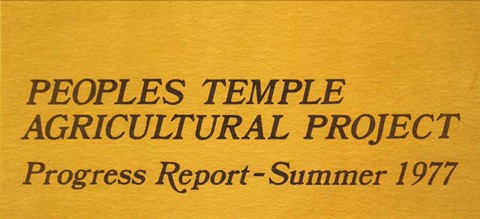
During one of our recent discussions about food taboos, a sage commenter noted that one of the theories regarding such prohibitions is that they aid social cohesion—if we can all agree to, say, eschew beef or Funyuns, we instantly have something that defines us in opposition to “The Other.” Given the inherent creepiness of that tactic, the commenter wondered, was there perhaps a history of cult leaders using food taboos to bind together their flocks?
Well, as it turns out, the answer appears to be a resounding “Yes!” A surprisingly large number of cults insist on austere vegetarian diets—if not in their formal literature, then at least in practice. The first example that springs to mind is the Unification Church, which has been known to feed its recruits a high-carb, low-protein diet consisting largely of rice and mashed legumes. The denizens of Jonestown subsisted on a similarly bland diet, as attested to by a very fortunate escapee:
The food was woefully inadequate. There was rice for breakfast, rice water soup for lunch, and rice and beans for dinner. On Sunday, we each received an egg and a cookie. Two or three times a week we had vegetables. Some very weak and elderly members received one egg per day. However, the food did improve markedly on the few occasions when there were outside visitors.
This dietary restrictions seem to have less to do with social cohesion, though, than with social control. Constantly hungry followers lack the energy to rebel, or even question. In fact, we reckon this applies to non-religious institutions as well—if you looked at successful political revolutions throughout history, don’t most of them take place in countries with at least a modicum of wealth? It’s tough to riot in the streets on an empty stomach.
The irony about the Unification Church’s dietary tactics, of course, is that the organization is a major player in the food industry. That sushi you had the other week? Chances are its passage from ocean to table benefited Rev. Moon in some small way, due to his control of True World Group.


scottstev // Jan 8, 2010 at 11:57 am
Assuming that your theory is true (and there’s no reason to believe that it’s not), the results are very depressing for the chances of social change in Zimbabwe or N. Korea. It’s like there’s a point of no return for misery, and once you pass it, the chances for a revolution diminish. You’ve got to wonder where Burma is on that scale (pretty close to no-return, I would suspect). Eritrea is probably in the same ball-park. On the other hand, Iran is much more likely to undergo a regime change before it’s misguided economic policies do permanent harm.
Going further, have we seen the results of social collapse in modern history? Would Somalia be a good example of what N. Korea would look like after a gov’t collapse without a revolution to instill a new form of gov’t? Not a cheerful thought to start the new decade.
tsg // Jan 8, 2010 at 12:50 pm
“[I]f you looked at successful political revolutions throughout history, don’t most of them take place in countries with at least a modicum of wealth?”
Um, what about the whole “let them eat cake” situation in France?
Brendan I. Koerner // Jan 8, 2010 at 1:01 pm
@tsg: Ah, but France was a relatively prosperous country at the time–which made the “recession” of the late 1780s hurt:
http://en.wikipedia.org/wiki/Causes_of_the_French_Revolution#Economics_And_Finances
@scottstev: Iran was, indeed, much in my thoughts as I wrote this post. Textbook example, with a twist–citizens don’t only have ample calories, but also enough disposable income to purchase consumer electronics. And that’s really aided their cause.
I’d be curious to know what the scenarios are for the collapse of N. Korea. There are many differences between the Hermit Kingdom and Somalia, the chief one being that the state is the main employer in the former country, whereas Somalia’s central government was never particularly strong. On top of that, there are all the family ties that link North to South, which could result in mass migration should chaos follow Kim Jong-il’s demise.
I should probably snoop around for some N. Korean collapse scenarios. I can only guess that none of them are very pretty.